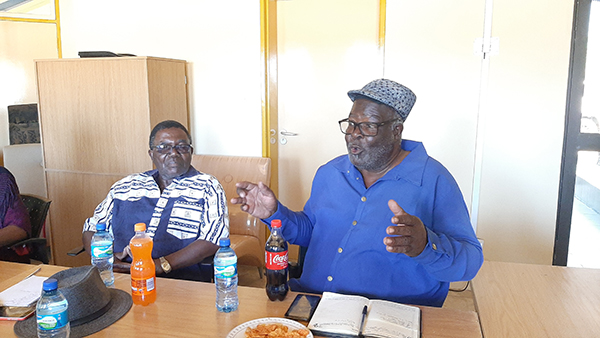OKOMBAHE – The visit of a parliamentary committee to the Daures constituency has opened a Pandora’s box of mining irregularities and deficient regulation in the area. Traditional authorities likewise agreed that they failed their communities by accepting allowances from mining companies.
“We only see people digging in our area without telling us how they end up there. Instead, they refer us to our government,” said the chief of Tubusis, David Goreseb.
Goreseb was highlighting the mining state of affairs in the Okombahe area and surrounding farms to the Parliamentary Standing Committee on Natural Resources on Monday.
The public hearing followed a motion tabled on 6 April by the Landless People’s Movement’s parliamentarian Henny Seibeb, who called for government to impose a moratorium on lithium mining to determine the real value of the rare earth metal, as well as the legality of mining operations in the constituency.
As a result, the committee comprising parliamentarians Tjekero Tweya, Kletus Karondo, Maria Elago, Bernadus Swartbooi and Maria Kamutali started conducting the hearings, which will end tomorrow.
The whole traditional authority was expected to attend the meeting, but only chief Ewaldt Neib from |Urikrens showed up.
Goreseb said the traditional authority is completely sidelined by the mines ministry when it comes to mining activities in their jurisdiction, and consent letters are only issued by their chief.
“There is an overall lack of communication among the traditional authority and the community. That is why some illegal mining has continued over the years. We, as traditional authorities, have the power to stop illegal activities. But perhaps we are reluctant due to the lack of communication”, he added.
As a result, the community is at risk as such mining activities are even conducted within 300 metres of people’s homes.
Furthermore, there are risks of water contamination due to the proximity of the drilling being conducted close to the community and water points.
“We didn’t even know who had claims in our area. We just saw people showing up and digging trenches. Some left without rehabilitating these mines”, he continued.
Neib, on his part, said they detected mining activities in Tubusis, Kettlefarm and other areas.
According to him, one mine has been abandoned for almost three years, while another has not been operating for close to eight years.
“These mines have been excavated, and left just like that. They contain a lot of water, and animals fall into these trenches as there are no fences,” he lamented.
Neib said they reported this issue to the ministry, but nothing has been done to date. Yet, farmers are losing livestock.
However, member of parliament Swartbooi questioned the chiefs on why they did not execute their powers when they detected illegal mining.
“If you claim you have powers, why don’t you stop the activities if you know they are mining illegally? Why didn’t you act and stop the activities, but you waited instead for the community to raise concerns while you are their guardians and custodians of the natural resources of your constituency?” Swartbooi asked.
Meanwhile, the Daure Daman Traditional Authority councillors could not give clear answers to the committee when grilled on allegations of bribery, illegal mining and selling consent letters to potential investors.
Some of the traditional councillors admitted being paid “sitting allowances” by a certain Chinese company and other donations as well as having a memorandum of understanding with Xinfeng Investments.
The group was grilled in the absence of their chief on the allegations, but frustrated the committee by being evasive.
Nonetheless, traditional councillor Johannes Gariseb admitted that the traditional authority failed the community by giving a letter of consent to Xinfeng Investments.
“We really failed the community, but it is a learning curve,” he said while indicating that they have a memorandum of understanding with that company.
Another traditional councillor, Entenesia Tjiveze, also admitted that they are allegedly paid sitting fees by potential investors. These fees, she added, are about N$400.
“There is a sitting allowance for our councillors. Some of the EPL holders give each councillor N$400. We did not force them nor did we inform them that they have to pay for a consent letter,” she stated.
– edeklerk@nepc.com.na


